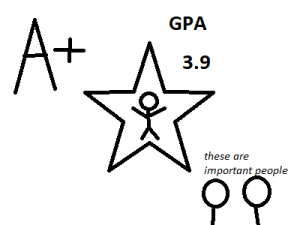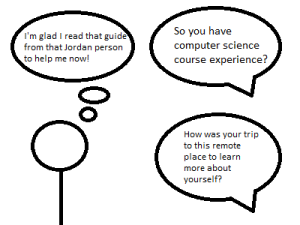8
Jordan Cantor
An Introduction Into A Brutally Honest Guide Of Medical School:
I’ll just come out and say the truth: most students will not make it to medical school. As sad as that might be, it is the truth. Most guides you read on college and medical school highlight the fact that it is a hard and competitive place, but those guides say anyone can do it; in reality, an average college biology class has about half those students next semester in organic chemistry, and a very lucky classroom has three students complete medical school. This guide is not to convince you out of dreaming of medical school, but it will either have you realize the truth of the situation or motivate you through passive aggressive statements. This guide won’t have a lot of complex drawing because, honestly, you won’t take the time to read some complex flowchart someone made rather than some simple drawing that you can easily remember. I’m a college student, just like you are going to be or currently are, and I know I would ignore the flowchart as well.
Preparing Before Entering College
An important part of the whole process of getting into medical school is being prepared before you even get into college. It is crucial to be sure that being in the medical field is something you want to do, as it will take a large amount of time and dedication to obtain a job in the medical field. To find out if this would be a career you are interested in, go into your community and reach out to doctors in the area to request a job shadowing opportunity to watch them in action. There are many unique jobs in the medical field, and while it isn’t as important to know exactly what until later in college, it is recommended to have a goal, even if temporary. This will allow you to have a reason to continue going through college, even if you change that goal in a later year. Having experience earlier than college also looks better on a resume, as you are working towards your goal earlier than others will, giving you an edge over them. This can include many things, from internships and volunteer time. Once you get into college, you will have more chances to show yourself, but it is good to have something before you get there.

Choosing The Right College
The next step for getting into medical school is finding the right college for you. Take some time to research both local and far options, as you can discover more variety through those options. It is important to find not only a college that supports medical/biology, but one that is the correct feel for you. Despite all the reviews a college may have, they mean nothing if you think it is the right college for you. After looking it up online, set up a visit to see the campus with your eyes. After finding the right college for you, set a few other colleges to apply to as well. Instead of only applying to one single college, it is important to at least look like you are interested in other places. If a college wants you more, they will be willing to offer more scholarship money for it, making it easier to decide and search for colleges. Once you get accepted into your dream college, it is time to start your real journey to medical school.

Getting Ready For The Best And Worst
College is an amazing time, and it will be a large highlight of your life; however, what you do while in college will vary across different people. In a nice and positive world, everyone will study hard and pass college, and everyone will be in medical school. In reality, only about half the people who begin the journey to medical school will make it through the first year. Others will switch majors, and some will become alcoholics and ruin their college for themselves later for simple satisfaction in the moment. Nobody guarantees that college is easy, and it isn’t. You’re at a point in your life where you will be challenged by classes; it depends entirely on your ability to study and time manage very well, or you manage to last minute everything to high quality. Whichever you decide, both are great skills to have and both should be something you are good at. No matter what, it’s important to know that if you believe in yourself, you can make it through all the way.

Making A Good Impression
A crucial thing to note after making into college is that you are not expected to stay. If you don’t push yourself to a higher standard, you could end up getting kicked out of college for an academic failure. If you do stupid things, such as drinking excessively and ruining your college experience, you could easily get remove from the campus. Once that happens, you’re lucky to get back into another college to continue your journey. Ensure that your first year in college will be a good one to get more scholarship money and positive views from professors, as the connections you make will assist you greatly in the future. Maintaining a very high grade point average will allow you to show the professors you are trying and give an impression to others who you might not be able to meet immediately. On top of that, a good GPA will look very well on a resume into medical school, so you should make sure to always prioritize grades.

Questioning The Recent Year
Take a moment after finishing your first year of college, being whatever respective major you might be. Is this really something you want to spend your next three years getting, only to spend even more time in another school to learn even harder things? Are you really sure about that? These questions will come to haunt you once passing the first year of college. Being in the medical field is the furthest job from easy to get; however, if it was easy, then everyone would just be doctors. If you feel like you simply can’t do it, then it is fine to realize this and find another major. Many college students are somewhat scared of changing their major, but way more students change their major than believed. The easiest thing to do in this situation is just leave the problem behind and drop out; on the contrary, would you want to let that year or more you have already done in college serve you no purpose whatsoever? Nobody would force you into a major you really don’t want, but if you truly want a medical school to notice you, stick with the degree and don’t give up. Medical schools try to weed out those willing to give up by having such absurd requirements, resulting in the undetermined to drop out or switch. If you really want to become a doctor, then take the struggling road and be what you want to be, and do not let anything unmotivate you from doing it.

The First Summer
Assuming the best, you have just finished your first year of college and decided to continue on this grueling path that will only pay out a few years after starting it: congratulations! You have outperformed about half your class and will continue to see more fail around you! This is a normal thing that happens when the people who want to be given a degree and a doctoral profession realize that it won’t be simply handed to them, and it will never be given out to people who just expect it to be given to them. Instead of taking this in a negative way, take it as motivation that you are slowly making your way to the place that you want to be: a medical school. Now that you have done such wonderful work (at least according to your own standards), you get ready to relax at home and leisure days away… until a guide tells you that it won’t be as relaxing as you daydreamed about. While you might not be able to sleep twenty hours a day, this lack of relaxation doesn’t mean you won’t be having fun. Make sure you stand out from other students and find an interesting research or intern opportunity. Now that you can say you are a college student, you will notice a few more chances to do interesting things around the community; maybe even a job related to a medical profession if you are lucky. Use the professors who have taken a liking to you as a source of possible research opportunities. Take these opportunities, and you should do something that you enjoy so your resume increases along with your level of happiness over the summer.

Reach Outside Of Medical-Related Subjects
If you are trying to get into medical school, you would think that filling your resume with a lot of medical-based things would be good, right? I wish that was the case too, but you have to make yourself look like you aren’t relying on the medical field as your only desired job. Medical schools like to see incoming students do things that are not medical related (and yes, that is weird to think about at first), as they tend to show the side of a student that you can’t reveal through an interview. Also, they just make the interviewer have an easier time with finding topics to talk about. As you start to clear up some of these empty slots in your class schedule as you complete required courses, consider adding in some classes that aren’t needed to your major and might even be completely unrelated to your other classes. These courses seem pointless and worthless since they don’t directly relate to your major, but medical schools will absolutely love to notice all the small but impressive things you did unrelated to the medical field.

Tackle Very Hard Courses In College
Don’t be the person who thinks that everything will be perfectly fine if they just take the things that are required and nothing extra. Those people often are the ones you see not making it past the gap between university colleges and medical college, doomed to return back to college, only to pay more money to take classes they could have taken before. By challenging yourself to do hard courses, it makes you look a lot more studious when you pass them. Medical schools think it is wonderful to challenge yourself with courses. These challenging courses will allow you to demonstrate your abilities of class performance to the medical school even before you go into an interview. Having many difficult classes on your transcript makes a wonderful preview for yourself, and it makes you very unique to the other applicants.

The MCAT: The ACT Of Medical Schools
You thought the ACT you took in junior year of high school was long? Well, you’ve got the MCAT to look forward, and that test is a wonderful eight hours of testing; however, you do get an hour break somewhere in that if you want. Imagine it like the ACT of medical school, only a lot harder and longer. The MCAT is a large milestone in your path to medical school, and I like to identify it as the last time you can consider changing majors to something not medical related, as you basically state your interest in medical school once you take the MCAT. It is important to do well on the MCAT, and many medical students will tell you that as well. The test will be worth it in the end once you complete it, as you will have done one of the largest steps in the process of getting into medical school. I would recommend taking the MCAT no later than your junior year of college, and even sooner than that if you are willing to dedicate yourself hard enough.

Finding A Source Of Motivation In Others
One of the most important things to remember throughout your journey as a pre-medical school student is that there are other people around you who want you to success. The reason this section is last is because those who actually read all the way to the end of this guide are probably the ones who are most likely going to be the group of successful people, so you deserve to know the key part of the journey to medical school. It is perfectly fine to ask for help, and there is no shame in needing to. You will struggle at some point in college, but having people there to help you through it makes it much easier to work through. The importance of the connections you make in college is that you get to create motivating friends and meet amazing professors that will be there for you whenever you need help. I couldn’t have found a more perfect set of professors to help me through classes and even become friends with, and I have met many new people who I have become close friends with over the small time of a couple of months. If there is anything I could tell to an incoming college student who wants to go to medical school, it is that I would recommend building strong connections with many people across the campus, as that will lead to many beneficial things over the course of college.


